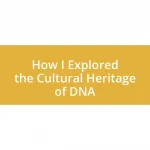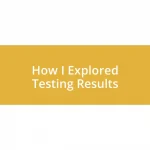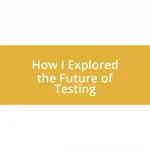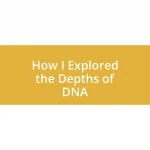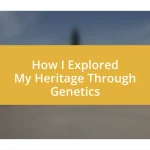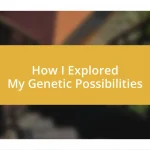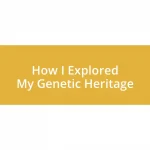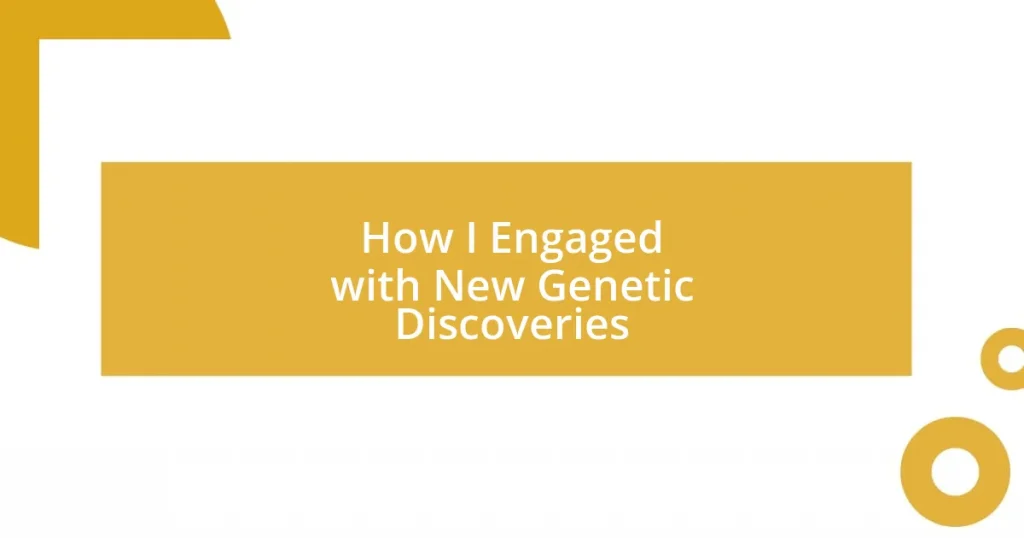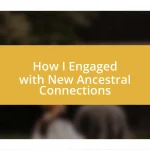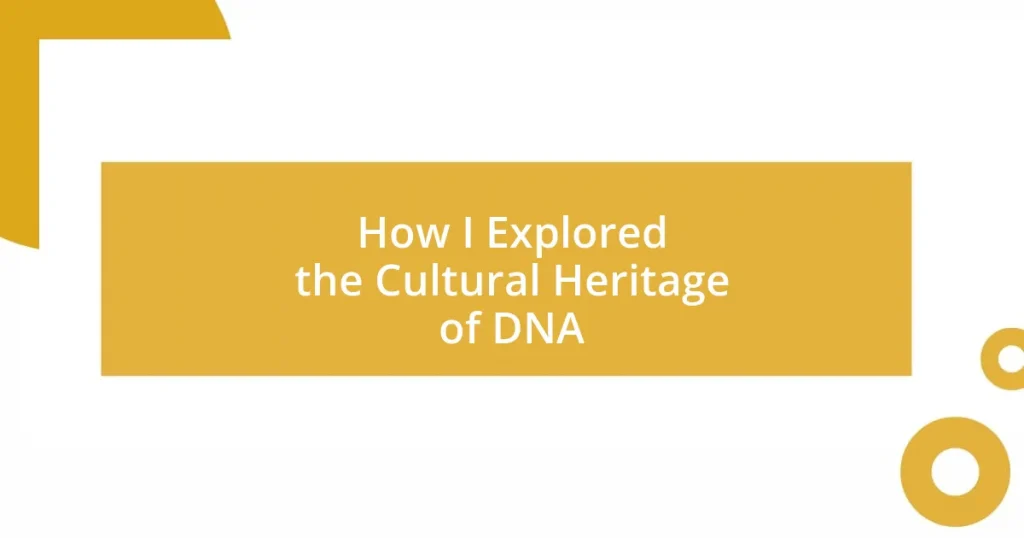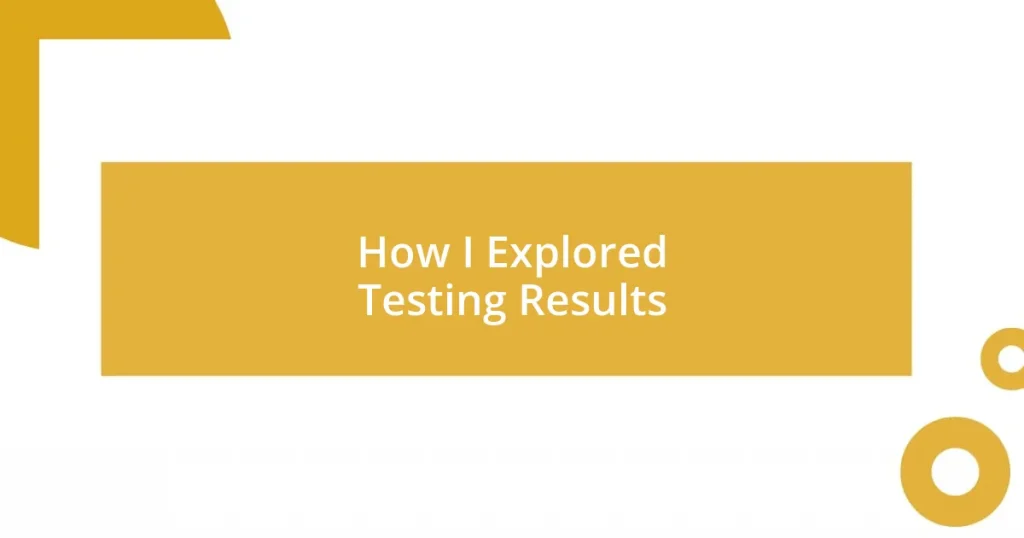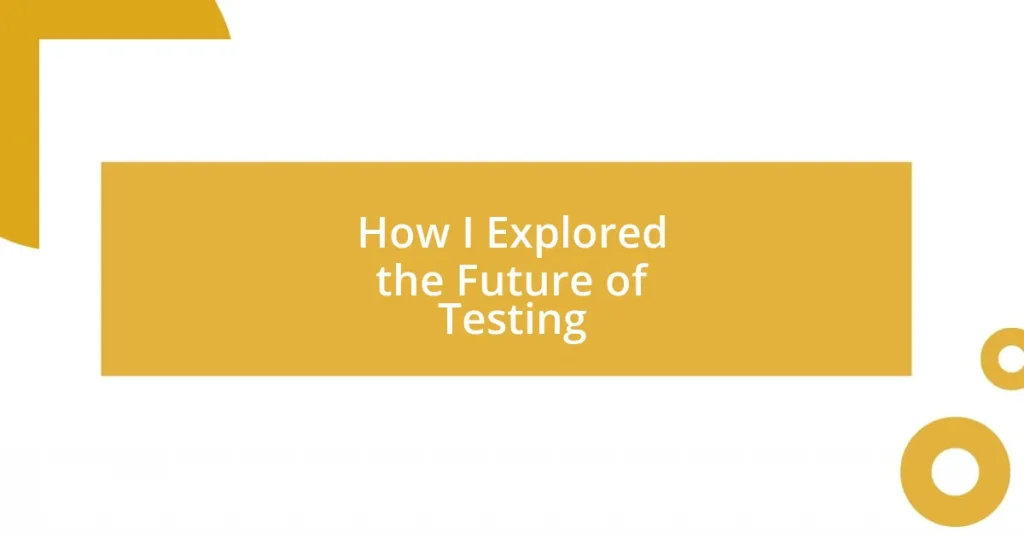Key takeaways:
- CRISPR technology represents a revolutionary tool in gene editing, prompting hopes for new disease treatments.
- Participation in genetic studies allows individuals to contribute personal narratives, enhancing scientific research and understanding.
- Genetic testing not only reveals personal health insights but also facilitates meaningful family discussions and empowers health decisions.
- Staying updated with genetic advancements fosters community engagement, leading to important dialogues around ethics and collective health responsibility.
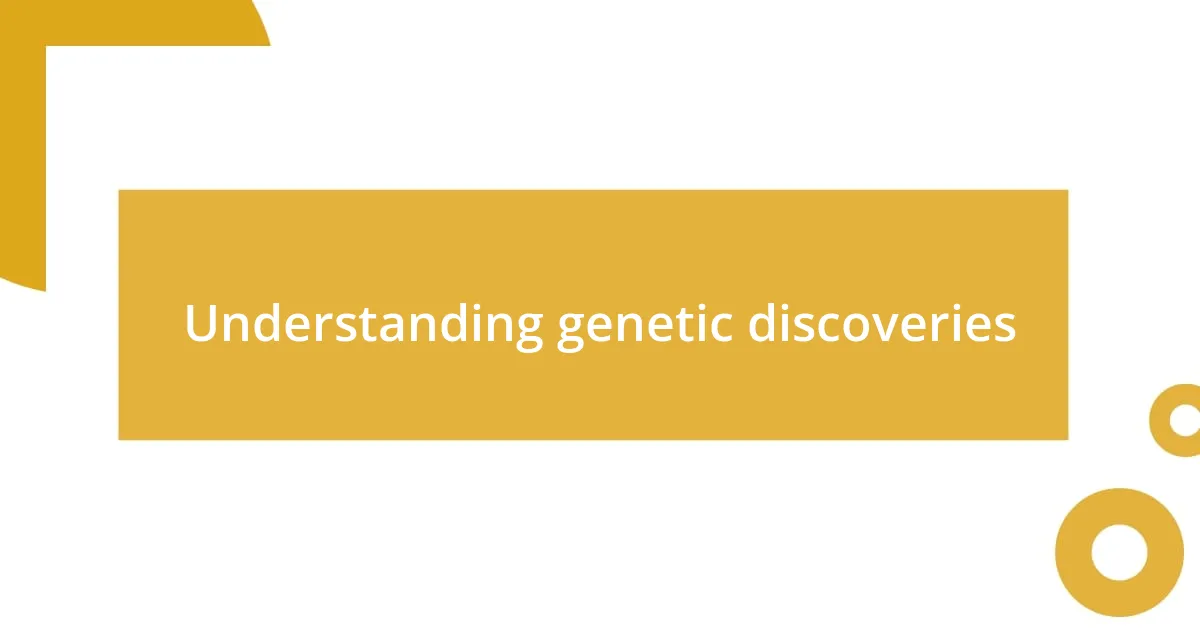
Understanding genetic discoveries
Genetic discoveries are a window into the intricate blueprint of life. I recall the moment I first learned about CRISPR technology—an incredible tool that allows scientists to edit genes with precision. It felt like I was standing on the edge of something revolutionary, and I couldn’t help but wonder how this would reshape our understanding of diseases.
As I delved deeper, I found myself captivated by stories of individuals whose lives transformed due to genetic research. One such story involved a young girl battling a rare genetic disorder. Her parents shared their journey of hope and despair, and it struck me how powerful the intersection of science and personal experience can be. How different might her life be with these emerging therapies tailored just for her condition?
Engaging with genetic discoveries isn’t just about the science; it’s about the human stories behind them. Each finding unlocks new possibilities and brings us closer to understanding our own biology. Have you ever considered how your genetic makeup influences your traits? Reflecting on this made me appreciate the delicate interplay between our genes and our lived experiences, creating a profound connection to the research.
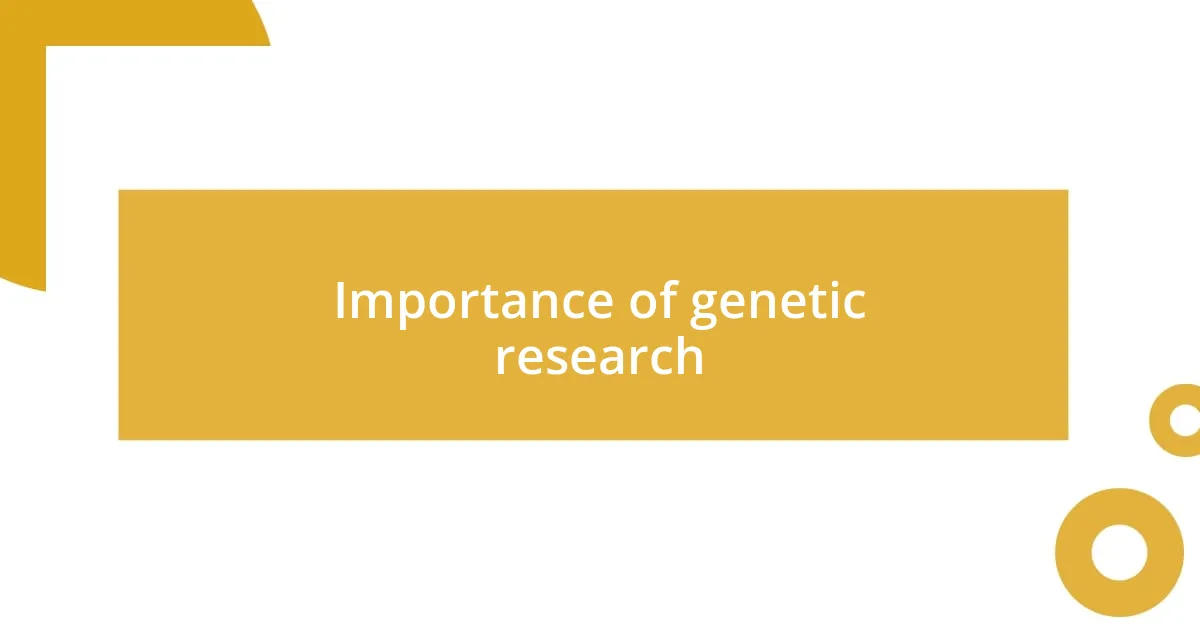
Importance of genetic research
Genetic research is not just a scientific endeavor; it represents hope for many individuals facing life-altering health challenges. I vividly remember attending a seminar where a lead researcher presented findings on gene therapy for inherited blindness. The emotion in his voice when he described the first patient who could see her child’s face for the first time was palpable. It was a reminder that behind every research paper is the potential to change lives in ways we can hardly imagine.
Another aspect that resonates with me is how genetic research can inform personalized medicine. I once read about a study where cancer treatments were tailored to a patient’s genetic profile. This personalized approach not only improved outcomes but also made the patient feel involved in their own health journey. It’s striking to think about how understanding one’s genetics can lead to therapies that aren’t just generic but specifically designed for individuals—like being handed a key that fits perfectly into a complex lock.
Finally, the ethical implications of genetic research are essential to consider. While we marvel at potential advancements, we must also grapple with questions about privacy and genetic discrimination. In my experience, discussing these issues with friends often leads to passionate debates. It’s clear that with great power comes great responsibility. We must proceed with caution and openness to ensure that the benefits of genetic research serve humanity positively.
| Aspects of Genetic Research | Importance |
|---|---|
| Hope and Healing | Provides life-changing therapies for individuals with rare diseases |
| Personalized Medicine | Allows for treatments tailored specifically to genetic profiles, enhancing treatment efficacy |
| Ethical Considerations | Encourages discussions about privacy and equity in health care |
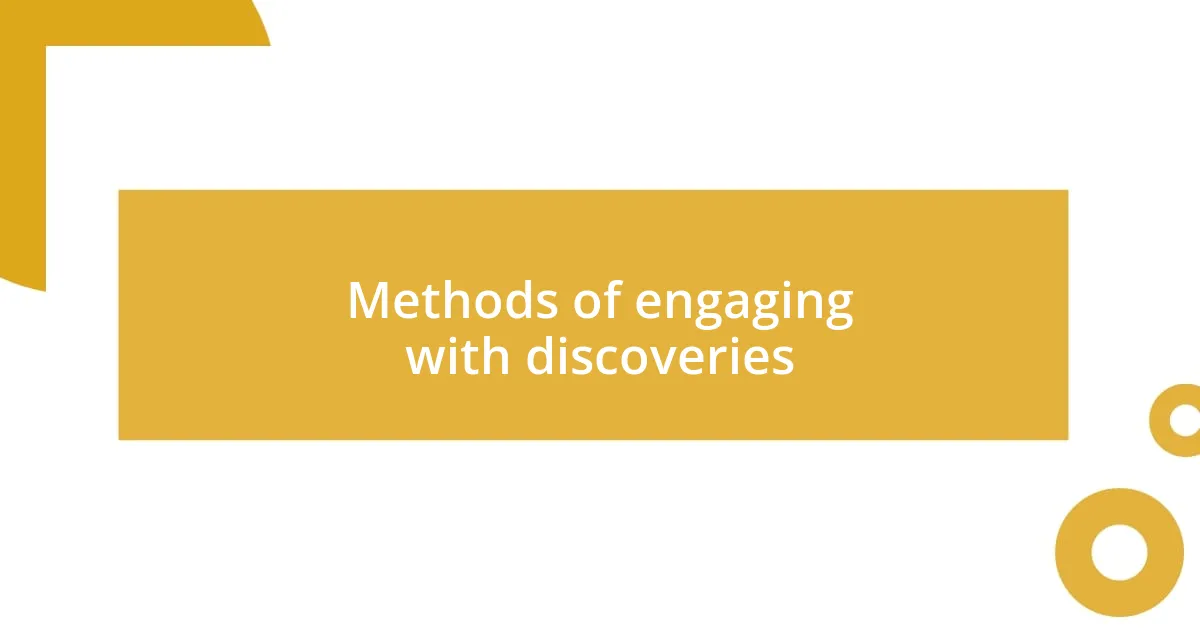
Methods of engaging with discoveries
Engaging with new genetic discoveries can take many forms, each unique in its approach and impact. One method that I found particularly enlightening was attending community workshops focused on genetic literacy. There, I had the chance to meet passionate individuals eager to share their insights and experiences firsthand. It was a welcoming environment where everyone, regardless of their scientific background, could participate in discussions. This made me realize just how essential these gatherings are for spreading awareness and fostering a collective understanding.
- Community workshops and seminars
- Online forums and social media groups dedicated to genetics
- Local university lectures or public talks on genetic research
Another method I embraced was diving into scientific literature. I vividly remember cracking open a journal filled with case studies and hearing the voices of researchers articulate their findings. It felt almost like a conversation with them. One article that moved me detailed a groundbreaking approach to gene editing that could potentially eradicate certain inherited disorders. As I absorbed the information, I felt a sense of urgency to share these discoveries with friends and family, sparking interest and conversation. Making the science accessible in everyday terms allowed us to reflect on what these advancements truly mean for our lives.
- Reading scientific journals and articles
- Blogging or writing about genetic discoveries to share insights
- Engaging in discussions with friends about recent advances
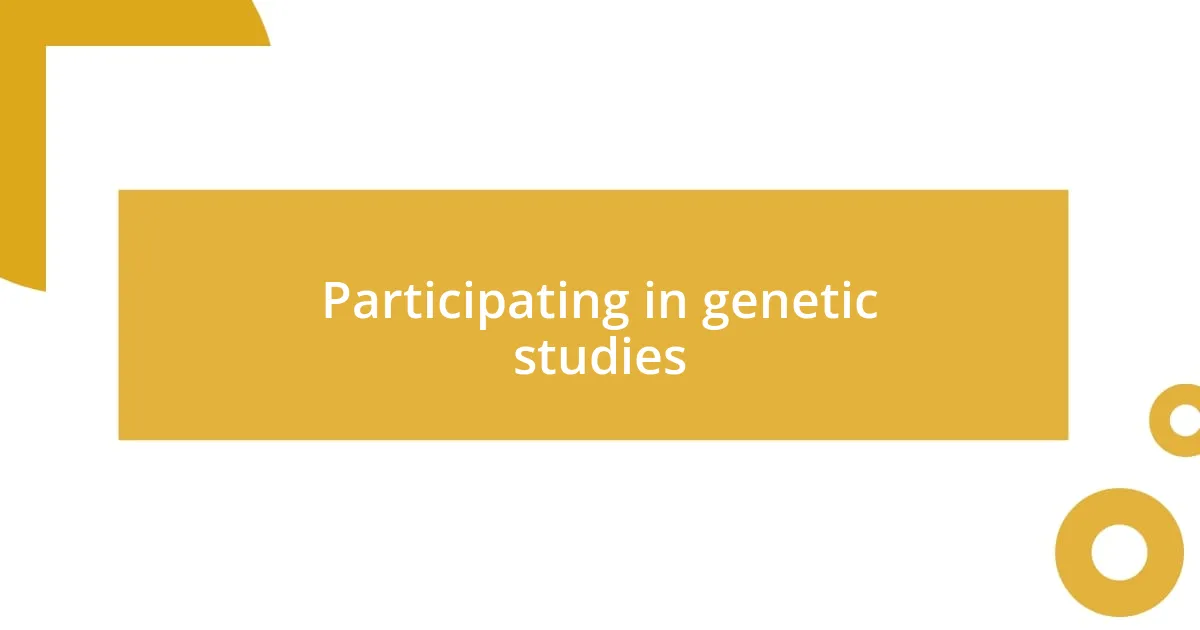
Participating in genetic studies
Participating in genetic studies is truly a unique experience that extends beyond mere observation; it offers a chance to be part of something greater. I recall when I decided to sign up for a local genetic study aimed at understanding the prevalence of specific hereditary conditions in our community. The initial thought of my genetic data being examined brought a mix of excitement and apprehension. However, I quickly realized that my participation could potentially contribute valuable insights to the research team, aiding in the development of therapies that could one day help individuals like myself.
What really struck me was the process of sharing personal medical history and family background with the researchers. It felt strangely empowering to contribute not just my DNA but also my narrative. I often wondered: could my family’s health challenges lead to breakthroughs for others? Engaging in this kind of dialogue allowed me to see my story as part of a larger dataset. It reinforced the idea that every participant counts and that our experiences can unlock doors to new understanding.
One memorable aspect of participating was the follow-up workshops where researchers shared preliminary findings and their implications. Hearing directly from scientists about how our contributions were shaping their work made it all feel real. I left those sessions feeling not just informed but like a vital piece of the scientific puzzle. It was a reminder that while genetic studies might seem abstract, they’re deeply personal—each data point represents lives, experiences, and above all, hope.
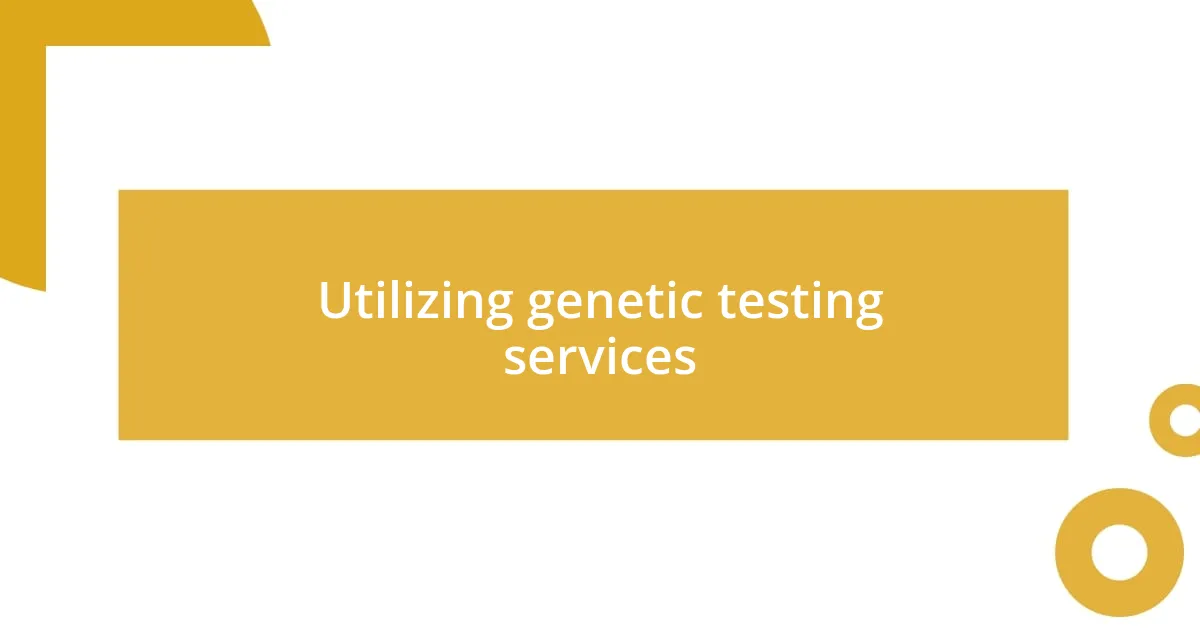
Utilizing genetic testing services
Utilizing genetic testing services has become an exciting frontier in my journey of understanding genetics. When I decided to get my own genetic test, I felt a mix of curiosity and hesitation. I remember the moment I received my results; it was like unwrapping a gift that held pieces of my identity. The insights about my ancestry and potential health risks were eye-opening, and it made me wonder how this information could empower me to make informed decisions about my health and lifestyle.
Moreover, the process opened avenues for deeper discussions with my family about our shared genetic background. I found myself engaging in heartfelt conversations, asking questions like, “What do we know about our family’s health history?” It was fascinating to realize how our stories intertwined—discovering diabetes in my grandmother led me to investigate my own risk levels. Each piece of information became a thread connecting us, emphasizing that genetic testing isn’t just about individual results; it’s about enhancing collective awareness.
I also explored various services available for genetic testing and discovered platforms that offered personalized genetic counseling. Participating in a session was transformative; the counselor took the time to explain complex genetic markers in ways that truly resonated with me. I left feeling more equipped to navigate not just my genetic predispositions but also the emotional implications of what those results might mean. Have you ever considered how your genetic makeup could inform your future health? It’s an enlightening journey that goes beyond mere data; it’s about embracing the full tapestry of who we are and how we can learn from it.
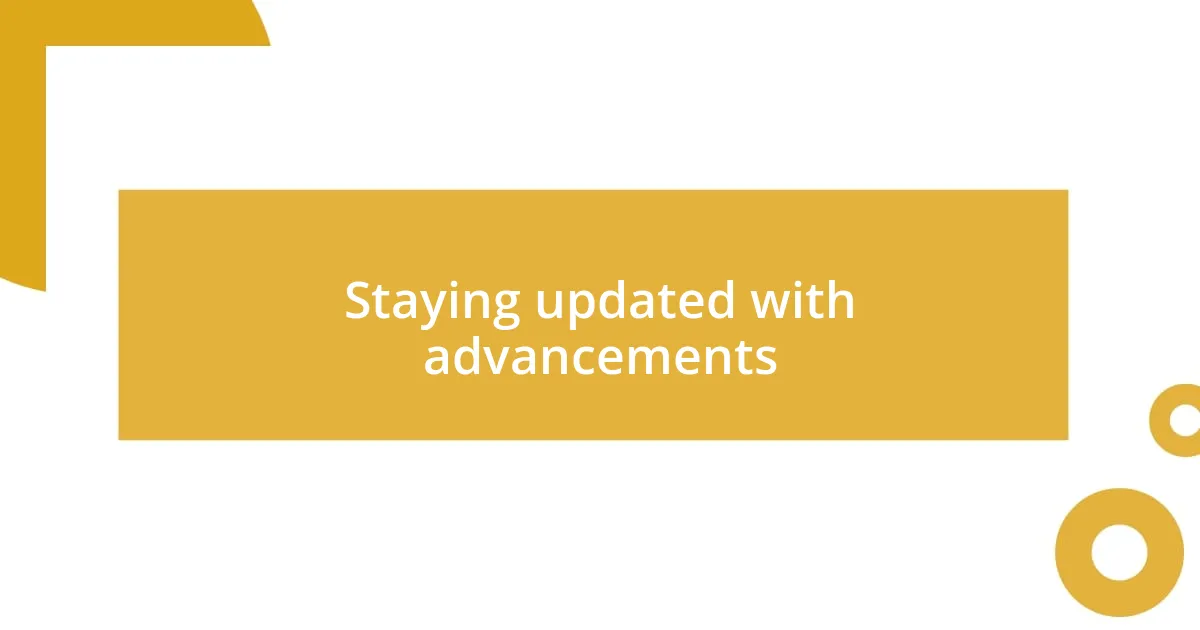
Staying updated with advancements
Staying updated with advancements in genetics is not just a passive endeavor—it’s an ongoing conversation that I actively engage in. I remember the first time I attended a genetics symposium. The energy in the room was palpable as researchers shared their groundbreaking findings. I couldn’t help but think about how these discoveries might impact my life and the wider community. It felt like being part of a vibrant ecosystem where ideas flowed freely and each speaker added to a greater understanding of our genetic blueprint.
Social media also plays a crucial role in keeping me informed. I follow several prominent geneticists and organizations that frequently post about the latest studies and breakthroughs. Just the other day, I came across a thread discussing CRISPR technology, and it sparked a flurry of thoughts in my mind—Could this lead to cures for genetic disorders we once deemed untreatable? Engaging with these platforms allows me to ask questions and connect with others who share my curiosity, fostering a sense of camaraderie in our quest for knowledge.
Additionally, I often dive into podcasts and webinars focused on genetics. One particular episode discussed the ethical considerations of gene editing, which left me pondering the moral responsibilities we carry as we advance in this field. It’s fascinating—and sometimes overwhelming—to contemplate how swiftly science is evolving. As I reflect on my own experiences, I’m left wondering: how can we ensure that advancements benefit everyone, not just a select few? It’s a dialogue that I believe is essential as we navigate these uncharted waters together.
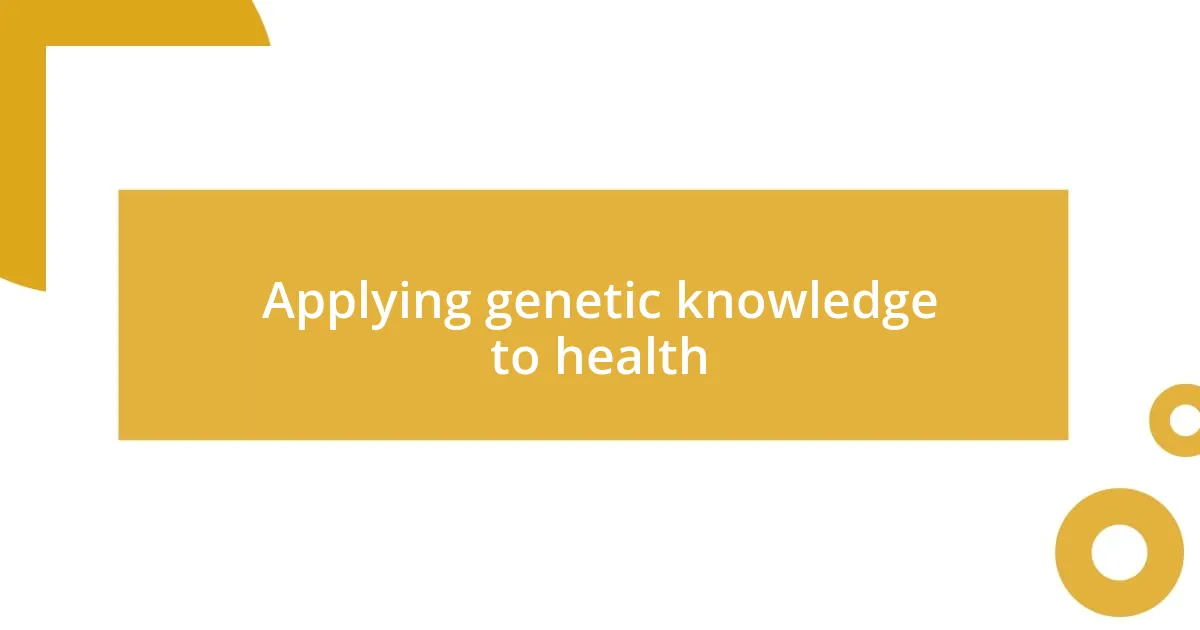
Applying genetic knowledge to health
Applying genetic knowledge to health has allowed me to rethink my approach to wellness. After discussing my genetic test results with a healthcare provider, I discovered specific lifestyle changes that could mitigate my risk for certain conditions. For instance, adjusting my diet to include more omega-3 fatty acids not only felt like a proactive step but also gave me peace of mind—knowing I was actively managing my health based on science burned a bright fire in me.
I’ve noticed that sharing this genetic insight with friends has led to meaningful discussions about health. One evening, while enjoying dinner with a close friend, we delved into the implications of her own family history with heart disease. I encouraged her to consider genetic testing as a tool for empowerment, prompting her to reflect on questions like, “What could I learn that my family hasn’t already revealed to me?” Witnessing her excitement about the potential knowledge spurred me to realize that these conversations can lead to crucial preventative measures, altering our health journeys.
Moreover, motivations inspired by genetic findings can be transformative. Recently, I participated in a support group where members shared personal stories related to their genetic predispositions. Listening to others discuss how this knowledge guided life changes—from choosing healthier habits to advocating for regular screenings—made me reflect on my own responsibilities. I couldn’t help but ask myself: How can we harness our understanding of genetics to not only improve our lives but also to support our loved ones? The truth is, genetic knowledge can be a life-altering catalyst for collective awareness and action.
